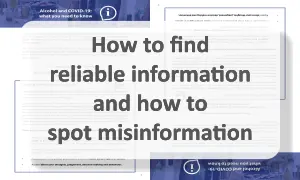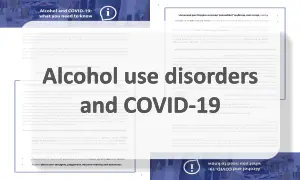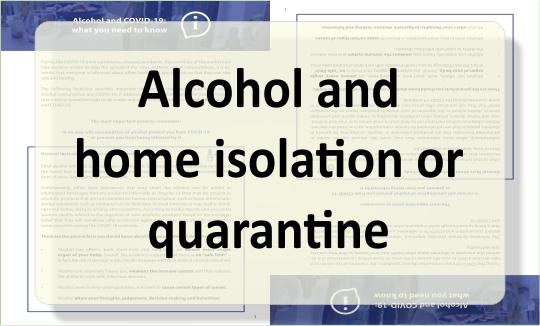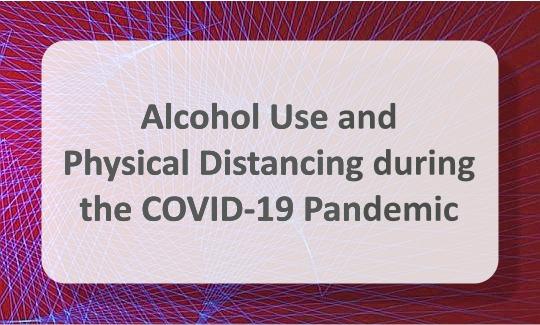How to find reliable information and how to spot misinformation

- Seek trusted sources of information, such as WHO, national health authorities and your health professional. For updated information on COVID-19, check the WHO website.
- Always double-check the information you receive. Beware of websites and texts that use the same messages and have the same writing and overall style, as these are likely to be viral messages produced for mass distribution that are intended to mislead.
- Beware of false and misleading claims, particularly in relation to the effects of alcohol on health and immunity. Such claims should be categorically discounted as a source of health information as there is no evidence that drinking alcohol offers any protection against COVID-19 or has a positive effect on the course and outcomes of any infectious disease.
- Beware of claims made online that alcohol offers any essential benefits that you really need to have during your period of home isolation or quarantine. Alcohol is in no way a necessary component of your diet and lifestyle.
- Be aware that websites and social media posts offering online sale and home delivery of alcoholic beverages can lead to increased alcohol consumption and may easily target children.
- If you do not drink, do not let any supposed health reason or claim persuade you to start.
Alcohol use disorders and COVID-19
Alcohol use disorders are characterized by heavy alcohol use and loss of control over alcohol intake. Although they are among the most prevalent mental disorders globally, they are also among the most stigmatized. People with an alcohol use disorder are at greater risk of COVID-19 not only because of the impact of alcohol on their health but also because they are more likely to experience homelessness or incarceration than other members of the population. It is therefore essential, under the current conditions, that people who need help because of their alcohol use get all the support they need. If you, or a person close to you, have problems in relation to alcohol use, please consider the following: The present situation is a unique opportunity to quit drinking, or at least to cut down considerably, as various social cues and peer pressure situations, such as parties, friends’ gatherings, restaurants and clubs, are (by necessity) avoidable. On…
Alcohol and home isolation or quarantine
To limit the spread of COVID-19, countries have progressively introduced community-wide lockdowns and periods of quarantine for those who are suspected of having contracted the virus or have been in contact with someone infected by the virus. This means that an unprecedented number of people are now staying in their homes. It is important to understand that alcohol poses risks to your health and safety and should therefore be avoided during periods of home isolation or quarantine. When working from home, adhere to your usual workplace rules and do not drink. Remember that after a lunch break you should still be in a fit state to work…
Alcohol use and physical distancing during the pandemic
Alcohol Use and Physical Distancing during the COVID-19 Pandemic To help slow the spread of the virus, the World Health Organization (WHO) recommends keeping at least three feet away from sick people as a protective measure. Bars, casinos, nightclubs, restaurants, and other places where people gather to consume alcohol, as well as house calls, increase the risk of transmission. Therefore, a protective measure such as physical distancing reduces the availability…


